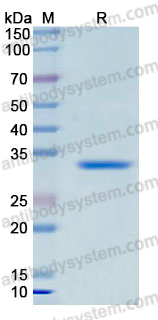Catalog No.
YHD58501
Expression system
E. coli
Species
Homo sapiens (Human)
Protein length
Ser210-Val295
Predicted molecular weight
33.76 kDa
Nature
Recombinant
Endotoxin level
Please contact with the lab for this information.
Purity
>90% as determined by SDS-PAGE.
Accession
P23490
Applications
ELISA, Immunogen, SDS-PAGE, WB, Bioactivity testing in progress
Form
Lyophilized
Storage buffer
Lyophilized from a solution in PBS pH 7.4, 0.02% NLS, 1mM EDTA, 4% Trehalose, 1% Mannitol.
Reconstitution
Reconstitute in sterile water for a stock solution. A copy of datasheet will be provided with the products, please refer to it for details.
Shipping
In general, proteins are provided as lyophilized powder/frozen liquid. They are shipped out with dry ice/blue ice unless customers require otherwise.
Stability and Storage
Use a manual defrost freezer and avoid repeated freeze thaw cycles. Store at 2 to 8°C for frequent use. Store at -20 to -80°C for twelve months from the date of receipt.
Alternative Names
LRN, LOR, Loricrin, LORICRIN
Lactobacillus brevis-Derived Exosomes Enhance Skin Barrier Integrity by Upregulating Key Barrier-Related Proteins., PMID:40356846
Abrocitinib versus dupilumab: Impact on skin barrier function and proteomics in atopic dermatitis., PMID:40246083
The novel house dust mite allergen Der p 39 exacerbates atopic dermatitis-like inflammation in mice by inducing skin barrier dysfunction., PMID:40196722
Nootkatone (NK), a grapefruit-derived sesquiterpenoid, suppresses UVB-induced damage by regulating NRF2-HO-1 and AhR-CYP1A1 signaling pathways in HaCaT cells., PMID:40151610
Dysregulation of STS in keratinocytes promotes calcium signaling and differentiation., PMID:40118897
Aloe polysaccharide promotes keratinocyte proliferation, migration, and differentiation by upregulating the EGFR/PKC-dependent signaling pathways., PMID:40064981
Temporal and spatial characterization of keratinocytes supporting orf virus replication., PMID:39958991
A role for Arginase in skin epithelial differentiation and anti-microbial peptide production., PMID:39950979
Poly-γ-Glutamic Acid from a Novel Bacillus subtilis Strain: Strengthening the Skin Barrier and Improving Moisture Retention in Keratinocytes and a Reconstructed Skin Model., PMID:39940752
Effect of low humidity on the barrier functions of keratinocytes in a reconstructed human epidermal model., PMID:39935117
The Use of HuEpiderm for Evaluating the Effectiveness of Biomaterials in Skin Repair., PMID:39887073
Lysyl Oxidase Mediates Proliferation and Differentiation in the Esophageal Epithelium., PMID:39766266
Steroid sulfatase suppresses keratinization by inducing proteasomal degradation of E-cadherin via Hakai regulation., PMID:39764917
Effect of the SGLT2 inhibitor ipragliflozin on the expression of genes that regulate skin function., PMID:39710589
Skin Function Improvement and Anti-Inflammatory Effects of Goat Meat Extract., PMID:39683006
Regulatory effects of Ishige okamurae extract and Diphlorethohydroxycarmalol on skin barrier function., PMID:39654745
Sodium Propionate Alleviates Atopic Dermatitis by Inhibiting Ferroptosis via Activation of LTBP2/FABP4 Signaling Pathway., PMID:39634285
Clinical and Genetic Findings in Patients With Palmoplantar Keratoderma., PMID:39630431
Revealing the Therapeutic Potential: Investigating the Impact of a Novel Witch Hazel Formula on Anti-Inflammation and Antioxidation., PMID:39575475
Topical delivery of bioactive compounds from Cortex Dictamni alleviates atopic dermatitis-like lesion by inhibiting the activation of keratinocytes, macrophages, and basophils: Dictamnine versus fraxinellone., PMID:39467349
Trehalose Prevents IL-4/IL-13-Induced Skin Barrier Impairment by Suppressing IL-33 Expression and Increasing NRF2 Activation in Human Keratinocytes In Vitro., PMID:39384017
Epidermal Differentiation Genes of the Common Wall Lizard Encode Proteins with Extremely Biased Amino Acid Contents., PMID:39336727
Establishment of a Mouse Model for Porokeratosis Due to Mevalonate Diphosphate Decarboxylase Deficiency., PMID:39323215
Ectoin attenuates cortisone-induced skin issues by suppression GR signaling and the UVB-induced overexpression of 11β-HSD1., PMID:39222375
Benvitimod upregulates filaggrin, involucrin and loricrin expressions via aryl hydrocarbon receptor-OVO-like 1 axis., PMID:39207509
Wrinkle Reduction Using Tetrapeptide-68 Contained in an O/W Formulation: A Randomized Double-Blind Placebo-Controlled Study., PMID:39204332
Melanin accumulation in acanthotic seborrheic keratosis: Reduced proliferation and early differentiation of keratinocytes and increased number of melanocytes., PMID:39005203
Sphingolipid-Enriched Porcine Placental Extract Promotes the Expression of Structural Genes and Desquamation Enzyme Genes in Cultured Human Keratinocytes., PMID:38945844
Evaluation of the therapeutic effect of Sacha inchi oil in atopic dermatitis mice., PMID:38917521
Prolyl Endopeptidase Is Involved in Filaggrinolysis and Cornification., PMID:38879153
Evaluation of the safety and efficacy of skin penetration enhancer Putocrin®., PMID:38867384
Topical application of Artemisia annua L. essential oil ameliorates 2,4-dintrochlorobenzene-induced atopic dermatitis in mice., PMID:38862031
(S)-(-)-blebbistatin O-benzoate has the potential to improve atopic dermatitis symptoms in NC/Nga mice by upregulating epidermal barrier function and inhibiting type 2 alarmin cytokine induction., PMID:38713650
Glycolic acid-induced disruption of epidermal homeostasis in a skin equivalent model: Insights into temporal dynamics and mechanisms., PMID:38710400
The water extracts from the oil cakes of Prinsepia utilis repair the epidermal barrier via up-regulating Corneocyte Envelope-proteins, lipid synthases, and tight junction proteins., PMID:38641077
Targeting IL-13 with tralokinumab normalizes type 2 inflammation in atopic dermatitis both early and at 2 years., PMID:38563683
Rh family C glycoprotein contributes to psoriatic inflammation through regulating the dysdifferentiation and cytokine secretion of keratinocytes., PMID:38514279
AMBRA1 and loricrin as a test to identify low-risk early-stage melanoma., PMID:38488655
Improving stability of human three dimensional skin equivalents using plasma surface treatment., PMID:38470332
Immunomodulatory and anti-angiogenesis effects of excavatolide B and its derivatives in alleviating atopic dermatitis., PMID:38368838
Lagerstroemia macrocarpa extract inhibits Th2-mediated STAT6 signaling pathway in human keratinocytes., PMID:38354819
Topical application of activator protein-1 inhibitor T-5224 suppresses inflammation and improves skin barrier function in a murine atopic dermatitis-like dermatitis., PMID:38350816
Skin repair and immunoregulatory effects of myeloid suppressor cells from human cord blood in atopic dermatitis., PMID:38264643
Development-Associated Genes of the Epidermal Differentiation Complex (EDC)., PMID:38248869
Adipose tissue-derived exosomes alleviate particulate matter-induced inflammatory response and skin barrier damage in atopic dermatitis-like triple-cell model., PMID:38241278
A modified protocol for studying filaggrin degradation using a reconstructed human epidermis model under low and high humidity., PMID:38124299
Epidermal keratinocyte-specific STAT3 deficiency aggravated atopic dermatitis-like skin inflammation in mice through TSLP upregulation., PMID:38053996
Vernix caseosa reveals mechanistic clues linking maternal obesity to atopic dermatitis pathogenesis., PMID:38048884
Involvement of transcribed lncRNA uc.291 in hyperproliferative skin disorders., PMID:38041107
Validation of epidermal AMBRA1 and loricrin (AMBLor) as a prognostic biomarker for nonulcerated American Joint Committee on Cancer stage I/II cutaneous melanoma., PMID:38006317


